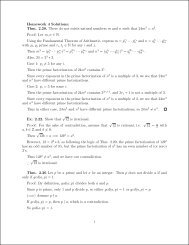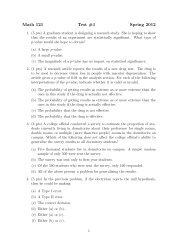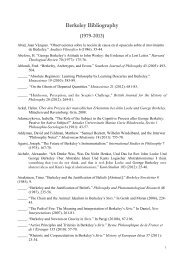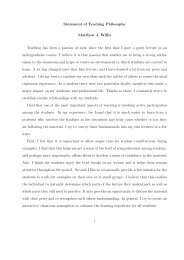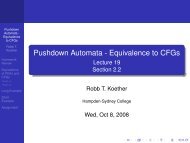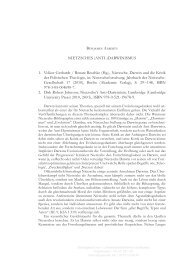Berkeley Is Pronounced Barclay - Home Pages
Berkeley Is Pronounced Barclay - Home Pages
Berkeley Is Pronounced Barclay - Home Pages
- No tags were found...
Create successful ePaper yourself
Turn your PDF publications into a flip-book with our unique Google optimized e-Paper software.
8REVIEWSJesseph is on different ground in dealing with The Analyst.He is prepared to make stronger philosophical claims for it. It ispresented as an essential pan of our understanding of <strong>Berkeley</strong>'saccount of science and mathematics and Jesseph claims that it isindependent of immaterialism (however still no discussion ofthis). He forays into the heady world of <strong>Berkeley</strong> scholarship indiscussing the possible identity of the 'infidel mathematician'attacked in the text. His presentation of the mathematicalbackground is detailed in comparison to his discussion of themechanical background to De Motu and his discussion of theelements of the infinitesimal calculus and Newton's calculus offluxions is clear, as is his account of <strong>Berkeley</strong>'s arguments againstthese. The 'outline analysis' of The Analyst is useful for thoseunfamiliar with that work. Once again the discussion of responsesto <strong>Berkeley</strong>'s position is scanty, as is the note on the text.As an introduction to the two texts it serves well - but no<strong>Berkeley</strong> novice would buy so expensive a work (£51.00)Specialists in <strong>Berkeley</strong> gain no great insights from theintroductory material and no detailed interpretative strategy ispresented. <strong>Is</strong>sues which could be addressed are sidestepped, suchas the immaterialism issue, the relation of theory of meaning toontology, etc.. It (rightly) claims no superior status for itstranslation of De Motu or the text of The Analyst over preexistingversions. What is puzzling about this book is who mightconstitute its intended readership.Paul O'CradyTrinity College Dublin9REVIEWSVision: Variations on Some Berkeleian Themes. Robert Schwartz,Oxford, Basil BIackwell, 1994, Pp. 162.This relatively short book, in four chapters, addresses some keyissues in the theory of vision: the manner in which we perceivedistance and size. and the nature and relevance of inference in theperceptual process. These issues are presented in the context of<strong>Berkeley</strong>'s seminal work on vision and throughout the book theauthor is at pains to present an impartial account of <strong>Berkeley</strong>'swork in the light of subsequent research. Appropriately, the bookconcludes with a comparison of <strong>Berkeley</strong>'s position with that of J.1. Gibson.Perhaps one of the most engaging qualities of the book is thefairness with which Schwartz treats not only <strong>Berkeley</strong> but all ofthe other "vision theorists", psychologists, and philosophers whopopulate the pages. Indeed, it is the willingness to attempt to see"what was really meant" in <strong>Berkeley</strong>'s writings, rather than beingcontent with the (often incorrect) interpretations of others, whichcontinually provides one with the motivation to carry on readingeven when one disagrees with Schwartz's perspective. Given that<strong>Berkeley</strong>'s writings are very often misunderstood, this is a verywelcome characteristic. Indeed, as a companion to <strong>Berkeley</strong>'s owntext, this book would play a very useful role in keeping a reader'sprejudices at bay whilst coming to an understanding of <strong>Berkeley</strong>'sintended message. Nonetheless Schwartz is no apologist for<strong>Berkeley</strong>; rather he provides an impartial assessment of<strong>Berkeley</strong>'s position on vision, an altogether more comfortableendeavour.



